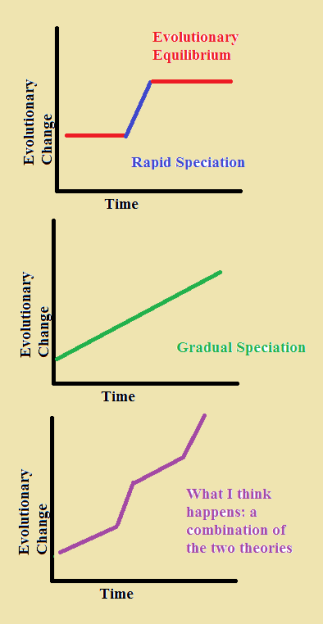Variability and evolution
Last post, I asked: would life in a stable environment evolve past the primordial ooze stage and what level of environmental variability is good for the evolution of intelligent life?
One of my college professors described evolution quite simply. He wrote, “Evolution is change” and left it at that. I’ve spent a long time trying to add qualifiers to that definition, because I, an individual, change and individuals cannot evolve. I’ve always thought that as a model, the “evolution is change” definition is too simple to be really valuable. Mathematically, though, that particular definition of evolution is useful. If one defines evolution as change, finding the rate of evolution in a population becomes a calculus problem.
There are two competing theories about the rate of evolutionary change, punctuated equilibrium and gradual change. The punctuated equilibrium theory argues that, because we see relatively few individuals in the fossil record in the process of speciation, speciation and evolutionary change happen quickly (thousands of years rather than millions). Then species remain relatively unchanged for the remainder of their history. The gradual change theory argues that the fossil record is not nearly complete so we should not expect to find examples of speciation, and that evolutionary change happens slowly but consistently. I think these two theories are both present in the natural world, and the two theories can be combined. Check out my super simplistic illustration of the concept below!
The chunks where rapid evolutionary change occurs would be caused by a big change in the organism’s environment. Most of the time though, chunks of gradual evolutionary change would be caused by small changes in the environment and other processes on a small scale. A stable environment could hold organisms that evolve intelligence, but I think evolution would be slow. Instead of the 3.6 billion years it took to get us and our industrialized society, it would take what? 7 billion years? 14 billion years, the entire life of the universe? Thankfully, our star is pretty young, so it might be possible for a species from a stable environment to evolve intelligence and then come find us as we evolved intelligence. I don’t think it’s likely though.
What level of variability is good for intelligent life? We can look at major sources of extinction and evolutionary change in the past to find about the stability of our environment. Here’s a brief list of possible causes for major extinctions: Temperature shifts, atmospheric changes, shifts in our magnetic field (look at Mars!), food sources vanishing, competition.
Earth has a relatively narrow temperature band (compared to Mercury, or the prison planet in Chronicles of Riddick) from 57.8o C (136o F) to -89.2o C (-128.6o F). Water doesn’t even get to boiling, here! Our atmosphere has had some pretty extreme shifts in the past but it’s been pretty stable for a long time now, with a Nitrogen, Carbon Dioxide, Oxygen mix that suits us well. The magnetic field has also been consistent for a long time, preventing solar winds from removing our ozone layer. Our ozone layer is important in preventing radiation from frying us. Life in general can deal with extremely variable environments but intelligent life needs a relatively stable abiotic environment in order to evolve I think. However, I also think that the biotic environment (competing organisms, prey species, etc.) needs to be fairly complex in order for intelligent life to thrive.
Sorry, folks. This post was not as exciting as the last one. However, if someone knows of an equation that’s been used to express the concepts above, I would give you an honorable mention in the next post if you could bring it to my attention!
